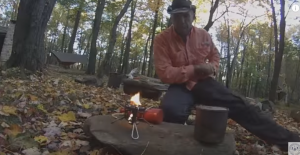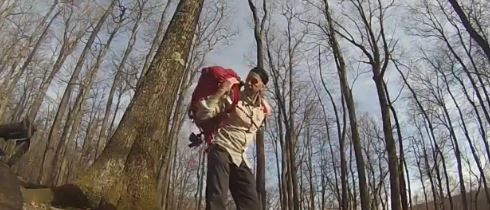 My hiking career didn’t begin as a solo venture, and I’m very glad that it didn’t. I didn’t have the skills, know-how, or courage to go alone. Instead, I tagged along with a couple of guys who had a little more knowledge than I did. Yet, it wasn’t their woodcraft that kept me in their company. Rather, I think that I was just too frightened to try it alone. It’s not that I was afraid of the woods – I was afraid of me.
My hiking career didn’t begin as a solo venture, and I’m very glad that it didn’t. I didn’t have the skills, know-how, or courage to go alone. Instead, I tagged along with a couple of guys who had a little more knowledge than I did. Yet, it wasn’t their woodcraft that kept me in their company. Rather, I think that I was just too frightened to try it alone. It’s not that I was afraid of the woods – I was afraid of me.
But over time things began to change. Things changed, not because I suddenly had a desire to go alone, but because my schedule didn’t always mesh with the schedules of my hiking friends. It simply worked out that if I wanted to be in the woods, then I would have to go alone. Fortunately, my confidence in myself had begun to grow.
Hiking solo has its own kinds of challenges and risks, as well as its own kinds of rewards. Some of the challenges are obvious, like being responsible for carrying all of your own gear and food. There’s also no guarantee that a hand will be nearby to help steady one across a stream, up a hill, or to help gather firewood for the night. All of those responsibilities would have to remain with the solo venturer. And, of course, there are the risks. Hiking solo means that if you roll an ankle, pull a muscle, or suffer any infinite number of accidents that your survival (yes, survival) may depend entirely upon you. Aaron Ralston, who wrote the book Between a Rock and a Hard Place, was forced to cut off his hand with a pocket knife to save himself in the desert. Had he not been solo that day, things would most certainly have turned out differently. The risks are obvious.

Yet, in spite of the challenges and risks of hiking solo there are some very distinct advantages. One of the most obvious gains is the ability to hike at one’s own pace, and to pause when pausing is good, and to hurry when that becomes a must. Dependent upon no one else’s schedule, walking alone invites the wanderer to walk at the inspiration of his or her own whims, delights, and needs. There is no one or nothing to please but one’s own two feet.
More importantly, however, for those of us who consider ourselves introverts, hiking alone becomes an essential part of our recovery from life. Unlike our counterparts, the extroverts who are empowered by social interaction, we feel drained by it. We need that alone time to not only let our feet wander, but our minds as well. We feed off of those fleeting encounters with aloneness so that we may emerge stronger and better people. As the din of busyness fades, so our hollowed souls, that had suffered greatly at the hands of social demands, are replenished and rejuvenated.
Also for me, I have also discovered that a much needed confidence can be restored by a walk of self reliance. Too often, life can leave me feeling inadequate and inept. I fall short of expectations, even those that are self-implied. ‘Can I do anything right?’, I often find myself asking.
That is why emerging alone from the woods has bolstered me. It has given me the satisfaction of knowing that there is at least one challenge that I can accept; one place I can go and not feel like a stranger; one situation in which these ten thumbs feel like fingers again.
Hiking solo may not be for everyone. But for those of us who hear its call, we gladly go alone because we have found that its benefits far outweigh its risks.
peace,
dane
Dane Cramer is a backpacker, Christian blogger, jail chaplain, amateur filmmaker, and author of two books: Romancing the Trail and The Nephilim: A Monster Among Us